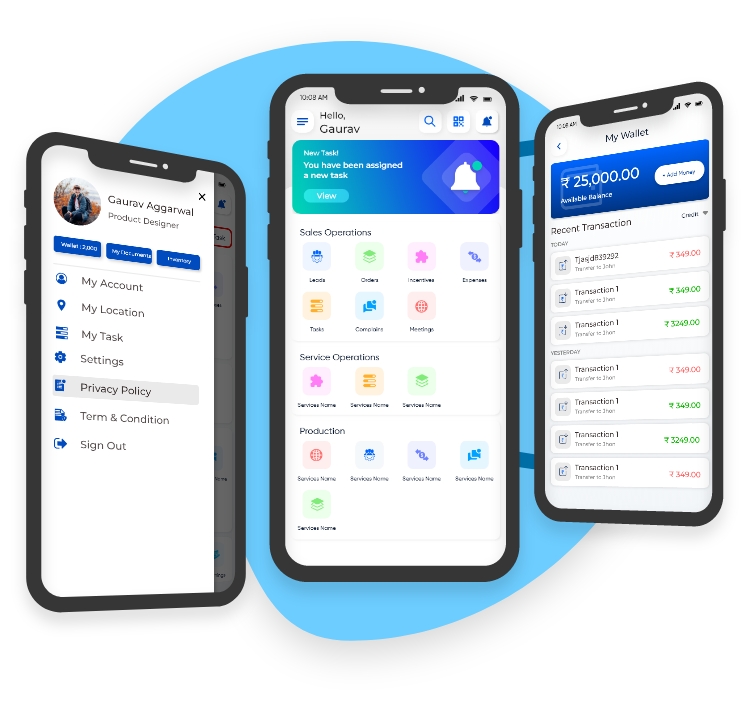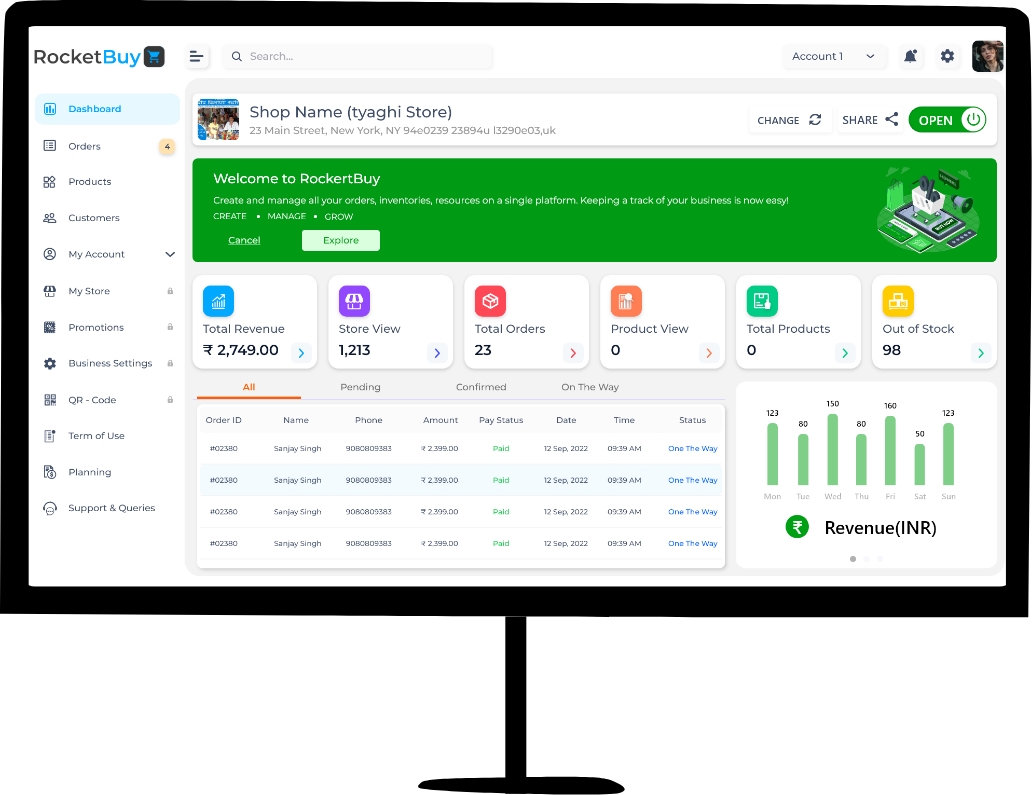Fleet Management Software System by RocketFlow can be accessed immediately as you sign up. The sign up takes less than 10 seconds. If you follow a unique process based on client requirements, RocketFlow Fleet Management Software supports customizing the process for you specifically. Start your free trial or Plan a Demo
Admin Dashboard
Admin Dashboard provides fleet managers with a comprehensive, real-time view of all fleet operations, offering end-to-end control over vehicles, drivers, and overall performance. Fleet Management Software System dashboard consolidates key metrics such as vehicle status, driver behavior, fuel consumption, maintenance schedules, and more into a single interface, allowing administrators to make informed decisions quickly. It also features customizable reports, fleet alerts, and performance analytics, enabling efficient fleet management and proactive issue resolution. Fleet Management Software System dashboard ensures seamless oversight and the ability to adjust fleet strategies as needed for optimal efficiency.

Vehicle Listing, Status, and Availability Management
The Vehicle Listing, Status, and Availability Management feature within the System Module provides fleet managers with a centralized view of all vehicles, including essential details such as make, model, registration, and maintenance history. This feature tracks each vehicle's real-time operational status, whether active, idle, in maintenance, or unavailable, allowing for efficient monitoring and deployment. With real-time availability tracking, businesses can optimize vehicle usage by ensuring that resources are allocated based on operational demands. The automated scheduling and conflict-avoidance alerts prevent booking overlaps, while utilization and idle time reports offer insights into fleet efficiency. By integrating availability data into route planning, businesses can further reduce delays and maximize fleet productivity. This feature enables better decision-making, leading to reduced downtime, improved resource management, and cost-effective operations.

Vehicle Document Management
Vehicle Document Management in Fleet Management Software System is a feature that helps fleet managers stay compliant with all regulatory requirements by tracking and managing critical vehicle documents such as registration, insurance, permits, and emissions certificates. Automated expiry reminders notify managers well in advance when renewals are due, preventing lapses that could lead to fines or vehicle downtime. This feature also stores all documents in a centralized digital repository, making it easy to access and share documents when needed.

Managing Earning and Expenditure
In Fleet Management Software System, Vehicle Earning & Expenditure Tracking feature enables businesses to monitor the financial performance of each vehicle in the fleet. It records revenue generated through trips, tasks, or deliveries while tracking all operational costs, including fuel, maintenance, repairs, and insurance. By analyzing earnings against expenditures, fleet managers can assess the profitability of each vehicle, optimize cost management, and make data-driven decisions to enhance the overall efficiency and financial health of the fleet.

Log Request for Vehicle
Fleet Management Software System logs every request or task assigned to and completed by a vehicle, providing a detailed history of its operational activities. From trips and deliveries to maintenance and refueling stops, every action is recorded and easily accessible through the system. This allows managers to track vehicle usage, assess performance, and ensure accountability. Additionally, this data is valuable for understanding vehicle efficiency, task completion times, and patterns that can be used to optimize fleet operations.

Service History
Service History feature in Fleet Management Software System maintains a comprehensive log of all maintenance, repairs, and service activities performed on each vehicle. It includes details such as service dates, parts replaced, repair types, and costs, ensuring full transparency in vehicle upkeep. By tracking this history, fleet managers can monitor the long-term health of vehicles, predict future maintenance needs, and reduce unexpected breakdowns. The system also provides insights into recurring issues, enabling more proactive fleet maintenance strategies.

Spare Parts Management
Spare Parts Management as a feature in Fleet Management Software System allows fleet managers to track and manage spare parts inventory. This includes logging the availability of parts, usage in repairs or maintenance, and tracking reorder levels. By ensuring the right parts are always in stock, this feature helps minimize downtime due to maintenance or repair delays. Additionally, detailed records of spare parts usage contribute to more accurate maintenance cost tracking and help streamline the supply chain for fleet repairs.

Tracking and Alerts
GPS Tracking and Alerts system enables real-time monitoring of vehicle locations, routes, and movement patterns in Fleet Management Software System. Fleet managers can track every vehicle in the fleet, ensuring they are following assigned routes and staying on schedule. Fleet Management Software System provides alerts for deviations such as unauthorized stops, excessive idling, or detours. Alerts for overspeeding, harsh braking, or aggressive driving help improve safety and optimize driver performance. Our GPS tracking system enhances operational visibility, enabling quicker responses to route changes, traffic, or other on-road challenges.

User Management and Accessibility
User Management feature provides robust control over driver profiles, onboarding, and KYC processes. Fleet managers can onboard new drivers by collecting all necessary documents (e.g., driver’s license, identification, certifications) and performing background checks. KYC data is securely stored, ensuring compliance with regulatory requirements.Fleet Management Software System also allows role-based access control, ensuring that different users (drivers, managers, admins) have access to the relevant parts of the system based on their roles and responsibilities, enhancing security and operational efficiency.


 Logistics
Logistics
 Automotive
Automotive
 Manufacturing
Manufacturing
 Real Estate
Real Estate
 Fleet
Fleet















































































